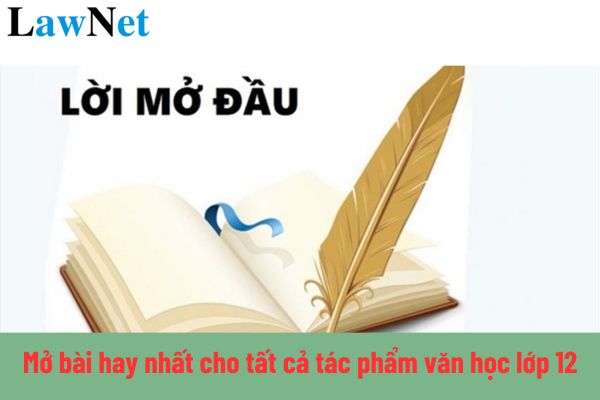Vietnam: What are the instructions for writing an introduction for an argumentative essay on literary works under the 12th-grade Literature curriculum? What knowledge does the 12th-grade Literature curriculum cover?
What are the instructions for writing an introduction for an argumentative essay on literary works under the 12th-grade Literature curriculum?
The introduction is a crucial part that helps guide the content and create an initial impression for an argumentative essay, especially an argumentative essay on literary works under the 12th-grade Literature curriculum. A good introduction not only introduces the work but also emphasizes the meaning and message the work intends to convey.
Below are some instructions for writing an introduction for an argumentative essay on literary works under the 12th-grade Literature curriculum:
|
Instructions for writing an introduction for an argumentative essay on literary works
|
*Note: The information is for reference only./.

What are the instructions for writing an introduction for an argumentative essay on literary works under the 12th-grade Literature curriculum? What knowledge does the 12th-grade Literature curriculum in Vietnam cover? (Image from the Internet)
What knowledge does the 12th-grade Literature curriculum in Vietnam cover?
Under sub-item 2, Section 5, of the General Education Program for Literature issued with Circular 32/2018/TT-BGDDT, the 12th-grade Literature curriculum in Vietnam covers the following knowledge:
*VIETNAMESE LANGUAGE KNOWLEDGE
- Preserve and develop the Vietnamese language
- Logical errors, ambiguous sentence errors, and corrections
- Rhetorical measures of irony, paradox: features and effects
- Text types and genres
+ Argumentative texts: the role of arguments, reasoning, and evidence; the purpose, emotions, and viewpoints of the writer; measures to enhance affirmation and negation in argumentative texts;
Argumentative reasoning and expressive language; speeches in launching events or social activities; essays on issues related to youth; comparative and evaluative literary essays of two works in the same or different genres
+ Informational texts: value of the subject, main information of the text; types of data and reliability of data; work exchange letters; project task reports or research results on natural or social issues
- Respect and protect intellectual property rights in study and research
- Basic features of formal and informal language: understanding and application
- Non-verbal communication tools: images, data, charts, diagrams, etc.
*LITERATURE KNOWLEDGE
- The cognitive, educational, and aesthetic functions of literature
- The consistency between theme, ideology, and predominant inspiration
- Some manifestations of artistic style in folk literature, medieval literature, modern literature, realism and romanticism trends; the artistic style of the author
- Certain elements of legendary stories, novels (modern and postmodern), modern lyrical poetry, comedy, memoirs
+ Legendary stories: theme, character, language, artistic techniques; evaluate the role of magical elements in legendary stories, relate to the role of these elements in folk tales
+ Novels (modern and postmodern): language, psychological developments, character actions
+ Modern lyrical poetry: language, images, symbols, allegorical, surreal elements
+ Comedy: language, character, situation, satirical techniques
+ Reports, diaries, or memoirs: non-fictionality, description, narration; combining real details, and events with the writer's experience, attitude, and evaluation
- Psychological developments of characters and the ways authors express them
- The relationship between the narrator, and perspective in expressing the theme of the text
- Basic understandings of Ho Chi Minh aiding in the comprehension of some exemplary works of this author
- A brief history of literature and the role of foundational literary knowledge in text comprehension.
What is the text corpus used for the 12th-grade Literature curriculum in Vietnam?
According to the regulations in subsection 2, Section 5 of the General Education Program for Literature issued with Circular 32/2018/TT-BGDDT, the text corpus used for the 12th-grade Literature curriculum in Vietnam includes:
(1). Literary Texts
- Legend stories, short stories, and modern novels
- Modern lyric poetry
- Comedy
- Reportage, diaries, or memoirs
(2). Argumentative Texts
- Social argumentation
- Literary argumentation
(3). Informational Texts
- Explanatory text incorporating one or more elements such as description, narration, expression, argumentation
- Research reports, work exchange letters

